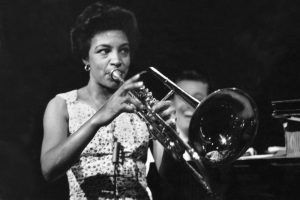
Melba Liston performs on Art Ford’s Jazz Party, a television program broadcast from Newark, N.J., in 1958.
Although Melba Liston was a woman in a male-dominated profession, she excelled anyway. Some consider her an unsung hero and she is very highly regarded in and outside of the jazz community as a trailblazer, as a musician and as a woman.
Melba Liston selected the trombone as her instrument because she thought it was the most beautiful thing she had ever seen. Only a year later, she was good enough to play a solo on a local radio station.
She broke barriers by joining the emerging major players of the bebop scene in the mid-1940s. She recorded with Dexter Gordon in 1947, and joined Dizzy Gillespie‘s big band, which included saxophonists John Coltrane, Paul Gonsalves, and pianist John Lewis. She toured with Count Basie, and then with Billie Holiday. But the experience of touring the south, coping with the strains of limited income and limited audiences, was strenuous, disheartening and exhausting.
In later years, Melba spoke candidly about the extreme difficulties of being a Black, female jazz musician during this era. More than being shunned or overlooked, she, and likely many other women musicians trying to make their way, were abused. Melba also dealt with larger issues of inequity in the industry. She had to continually prove her credentials and was not paid equitable scale.
In 1958, Melba Liston recorded her only album as a leader, Melba Liston and Her ‘Bones – a true gem in jazz history.
“Soundtrack to the Struggle” is written and hosted by Hollis Monroe. Produced by Ron Adkins. Executive Producer is Dennis Green.
Podcast (soundtrack): Play in new window | Download
Subscribe: Apple Podcasts | RSS
